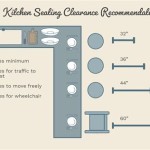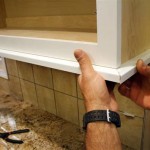How Much Does It Cost To Change A Kitchen Counter Top
Kitchen countertops are a central element in any kitchen design, both functionally and aesthetically. They withstand daily use and contribute significantly to the overall look and feel of the space. Over time, countertops can become worn, outdated, or simply no longer suit aesthetic preferences. When this occurs, replacing them becomes a viable consideration. Understanding the various factors that influence the cost of changing a kitchen countertop is crucial for effective budgeting and decision-making.
The cost of replacing a kitchen countertop is not a fixed figure; instead, it varies across a wide range depending on numerous elements. These factors include the material chosen, the size and complexity of the countertop installation, labor expenses, and any additional work required, such as plumbing or electrical modifications. A comprehensive assessment of these aspects is necessary to arrive at an accurate estimate.
Material Costs: The Primary Driver
The single most significant factor affecting the cost of a new countertop is the material. Countertop materials range from affordable laminates to high-end natural stone, each with its own price point determined by raw material costs, manufacturing processes, and availability.
Laminate: Laminate countertops are generally the most budget-friendly option. They consist of a plastic layer bonded to a particleboard core. Laminate offers a wide range of colors and patterns, including imitations of natural stone. The cost typically ranges from $10 to $40 per square foot installed. The affordability of laminate makes it a popular choice for homeowners seeking a cost-effective upgrade.
Tile: Tile countertops offer design flexibility and durability. They can be made from ceramic, porcelain, or stone, allowing for customization in color, pattern, and texture. However, installation can be labor-intensive, and grout lines require regular maintenance. The cost ranges from $15 to $75 per square foot installed, depending on the type of tile selected.
Solid Surface: Solid surface countertops are made from a blend of acrylic and polyester particles, offering a seamless, non-porous surface. They are resistant to stains and scratches and can be repaired if damaged. Solid surface countertops are mid-range in price, typically costing between $40 and $100 per square foot installed.
Butcher Block: Butcher block countertops are made from strips of wood glued together, providing a warm and natural aesthetic. They require regular oiling to maintain their appearance and prevent damage. Butcher block countertops can range from $35 to $200 per square foot installed, depending on the type of wood used and the construction method.
Quartz: Quartz countertops are engineered stone products made from crushed quartz crystals bound together with resin. They are durable, stain-resistant, and require minimal maintenance. Quartz countertops are available in a wide range of colors and patterns, often mimicking the look of natural stone. The cost typically ranges from $50 to $150 per square foot installed.
Granite: Granite countertops are made from natural stone, offering a unique and luxurious look. They are durable and heat-resistant but can be porous and require sealing to prevent staining. Granite countertops vary widely in price, ranging from $45 to $200 per square foot installed, depending on the quality and rarity of the stone.
Marble: Marble countertops are another natural stone option, prized for their elegant veining and smooth texture. However, marble is softer and more prone to staining and scratching than granite. Marble countertops typically cost between $75 and $250 per square foot installed.
Soapstone: Soapstone countertops are made from a natural stone known for its smooth, matte finish and heat resistance. They develop a patina over time, adding to their unique character. Soapstone countertops typically cost between $70 and $150 per square foot installed.
Concrete: Concrete countertops offer a modern and industrial aesthetic. They can be custom-designed and colored to suit individual preferences. Concrete countertops require sealing to prevent staining and can be prone to cracking. The cost ranges from $75 to $200 per square foot installed.
Installation and Labor Costs
In addition to the cost of the countertop material itself, installation and labor expenses comprise a significant portion of the overall project budget. These costs vary depending on the complexity of the installation, the region, and the experience of the installer.
Complexity of Installation: The complexity of the installation is influenced by factors such as the size and shape of the countertop, the number of cutouts required for sinks and appliances, and the need for custom fabrication. Intricate designs and challenging layouts will increase the labor time and subsequently the cost.
Demolition and Removal: The removal of the existing countertop can add to the labor costs. If the old countertop is difficult to remove or requires special handling, the price will increase. Some installers include the cost of demolition and disposal in their initial estimate, while others charge it separately.
Plumbing and Electrical Work: Changing a countertop often requires disconnecting and reconnecting plumbing and electrical fixtures. This may involve hiring licensed plumbers and electricians, which will add to the overall cost. The extent of these services depends on the existing configuration and any changes being made to the sink or appliance locations.
Seam Work: For larger countertops, seams may be necessary to join multiple pieces of material. The quality of the seam work can significantly impact the appearance and durability of the countertop. Experienced installers will be able to create nearly invisible seams, but this expertise comes at a higher price.
Edging and Finishing: The edging and finishing details of the countertop also contribute to the labor costs. Different edging profiles, such as bullnose, ogee, or beveled edges, require varying levels of skill and time to create. Polishing and sealing the countertop, particularly for natural stone materials, are essential for protecting the surface and enhancing its appearance.
Regional Variations: Labor costs can vary significantly depending on the geographic location. Areas with a higher cost of living typically have higher labor rates. The availability of skilled installers in a particular region can also affect the pricing.
Labor costs can generally be estimated to be $10 to $30 per square foot, but this is dependent on the material and complexity mentioned above.
Additional Cost Considerations
Beyond the material and installation costs, several other factors can influence the overall expense of changing a kitchen countertop. These additional considerations should be factored into the budget to avoid unexpected costs.
Sink and Faucet Replacement: If the existing sink and faucet are outdated or incompatible with the new countertop, they may need to be replaced. The cost of a new sink and faucet can range from a few hundred dollars to several thousand, depending on the style, material, and features. Installation of these fixtures will also add to the labor costs.
Backsplash Installation: While not always necessary, installing a new backsplash can enhance the aesthetic appeal of the kitchen and protect the wall from splashes and spills. Backsplash materials range from simple tile to elaborate stone mosaics, with corresponding variations in cost. The labor cost for backsplash installation will depend on the material and complexity of the design.
Structural Modifications: In some cases, structural modifications may be required to support the new countertop. This could involve reinforcing the cabinets or modifying the floor joists. Structural work can significantly increase the overall cost of the project and should be assessed by a qualified contractor.
Permits: Depending on the extent of the work, permits may be required from the local building department. Permit fees vary by location and the scope of the project. Failure to obtain necessary permits can result in fines and delays.
Disposal Fees: Disposing of the old countertop can incur disposal fees, particularly if it contains hazardous materials such as asbestos. These fees should be factored into the budget.
Hidden Costs: It's advisable to allocate a contingency fund to cover unexpected costs that may arise during the project. These could include unforeseen repairs, material shortages, or changes to the design. A contingency of 10% to 15% of the total project cost is generally recommended.
By carefully considering all of these factors – material costs, installation and labor expenses, and additional considerations – homeowners can develop a realistic budget for changing a kitchen countertop and make informed decisions to achieve their desired outcome.
It’s also essential to understand that DIY (Do-It-Yourself) installation is an option for some homeowners, potentially saving on labor costs. However, this route is only recommended for individuals with significant experience in home improvement projects, especially those involving plumbing and electrical work. Incorrect installation can lead to costly repairs and potential safety hazards.
Obtaining multiple quotes from different contractors is also a prudent step. Comparing estimates allows for a better understanding of market rates and can help identify potential discrepancies or hidden fees. Be sure to verify that each quote includes a detailed breakdown of all costs, including materials, labor, and any additional services.

How Much Does Kitchen Countertop Replacement Cost 2025 Data

Replacing Kitchen Countertops And Backsplash Cost Timeline Facts

When Should You Replace Granite Countertops And How Much Will It Cost Marble Com

Replacing Kitchen Countertops And Backsplash Cost Timeline Facts

Cost To Install Kitchen Countertops Countertop Replacement Fixr

Kitchen Countertop Replacement Cost How Much Is It

Kitchen Countertop Replacement A Cost Guide

Kitchen Countertop Replacement Materials And Cost Insights Kkr

Kitchen Countertop Replacement Cost In Nyc Mega Marble

Comparing Costs Granite Vs Quartz Marble Countertops
Related Posts








